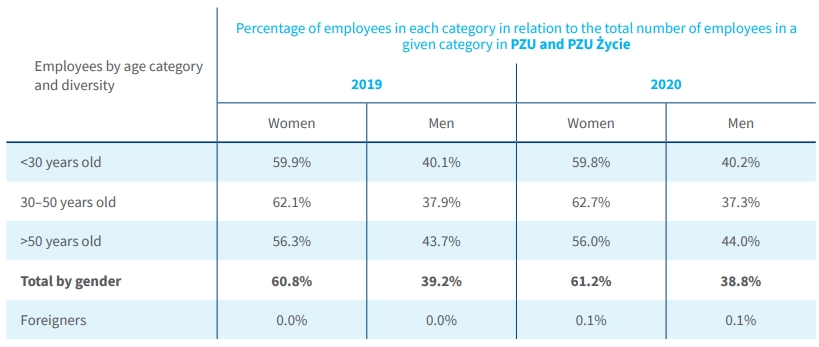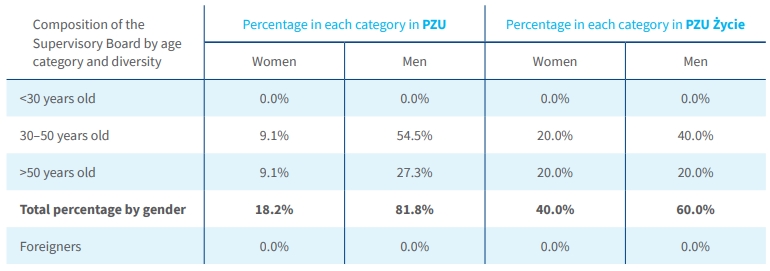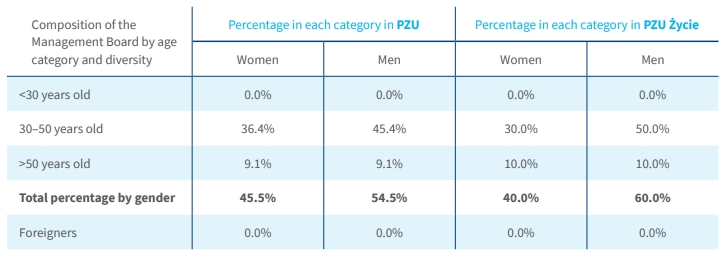The Group companies have anti-mobbing policies and internal procedures in place. In the case of companies with a low headcount, no separate regulations pertaining to prevention of mobbing have been implemented. The companies comply with the general document, “Best Practices of the PZU Group”, which indirectly regulates the conduct in a mobbing situation.
In the Pekao Group, the aim is to develop appropriate conditions and create a mobbingfree work atmosphere. The Anti-Mobbing Policy in force in Bank Pekao lays down the rules for counteracting conduct indicative of mobbing; additionally, it aims to underpin the execution of labor law regulations with respect to the obligation of combatting mobbing. The Policy has not been implemented in the Bank’s subsidiaries; however, some of them have devised internal procedures regulating this issue, including Pekao Bank Hipoteczny, Pekao Investment Banking, Pekao TFI and Pekao Financial Services Sp. z o.o. A Policy for Counteracting Mobbing and Discrimination has been implemented in Pekao Leasing.
The anti-mobbing policies and procedures implemented in PZU Zdrowie and its subsidiaries are compliant with the PZU Group’s guidelines.
In the Alior Bank Group, the personal dignity issue is taken care of in the Code of Conduct applicable to employees of all its member companies. The Code contains guidelines on applying the principles of professionalism and respect in the workplace as well as the principles of good manners, openness toward diversity and tolerance.
Alior Bank has a policy of creating a working environment free of undesirable behavior. According to its regulations, the principles in force in the Bank pertain, among others, to the following: counteracting mobbing and sexual harassment, offering equal opportunities to all employees regardless of their gender, age, disability, race, religion, nationality, political convictions, trade union membership, ethnic origin, denomination, sexual orientation, form of employment for a specified or unspecified term and full-time or part-time employment.
There is an internal anti-mobbing procedure in TFI PZU. PTE PZU, in turn, has in place a resolution on the rules for preventing mobbing in Powszechne Towarzystwo Emerytalne PZU Spółka Akcyjna. Among the purposes of this procedure is to define the procedure governing the appointment and responsibilities of the anti-mobbing committee.
[GRI 419-1]
No non-financial sanctions were recorded in PZU and PZU Życie in 2020 for compliance failure. In turn, two such sanctions totaling PLN 111,150 were recorded in PZU in 2019 and two sanctions totaling PLN 46,500 were imposed on PZU Życie. The 2019 claims pertained, among others, to improper termination of an employment contract, discrimination on grounds of health.
[GRI 406-1]
PZU attaches special importance to prevention of mobbing in the workplace and cares for a friendly work environment so that it is free of any unlawful behaviors. In 2020 the PZU Group confirmed 20 breaches of the rules of conduct pertaining to ethics and human rights (6 fewer than in 2019). 4 of them transpired in the Pekao Group and 16 in the Alior Bank Group. No cases of failing to comply with the rules on how to act when it comes to ethics and human rights were confirmed in PZU and PZU Życie. The substantiated notifications of breaches in the Alior Bank Group in 2020 pertained among others to undesirable conduct in the working environment involving discrimination, mobbing and the usage of improper practices in customer service. Commensurate official consequences such as termination of an employment contract for cause or by mutual consent, disciplinary talks, training sessions on soft skills and warnings were administered to the employees of the Alior Bank Group who exhibited such conduct or committed such undesirable violations. Two complaints were reported to the Anti-Mobbing Commission in the Pekao Group but mobbing was not ascertained in either of these cases. Other reports on the failure to abide by the rules concerned a superior’s improper conduct towards employees and a violation of the rules for ethical conduct in relationships between bosses and their reports. The commensurate consequences were administered to these employees in the form of warnings or dissolution of their employment relationship. At present, these persons no longer work for Pekao Leasing.
PZU does not accept intolerance, mobbing or other forms of discrimination. Legal acts including the Work Rules and Regulations and the Internal Anti-mobbing Procedure are in place to support the fight against mobbing. The Internal Anti-Mobbing Procedure currently in force was introduced by a directive issued by the President of the Management Board and is applicable to all employees regardless of the position held, while employees are familiarized with it at the outset of their employment. This procedure simply defines the actions to be taken in the event mobbing transpires in the organization. It has not required any change for more than a decade because of its suitability and simplicity, which is an additional guarantee of stability and the consistency of the actions taken by PZU to counteract mobbing.
An Anti-Mobbing Commission has been appointed to verify unacceptable behaviors. It reviews employee complaints and investigates each signal of behaviors that may have the features of mobbing. Persons with an education in law and psychology sit on the Anti-Mobbing Commission. As part of the care shown not just for legal aspects, but also to mitigate the emotional costs related to mobbing, in 2020 employees were given additional preventive psychological support in the form of a hotline on top of the psychological support provided in the traditional form to date.
In December 2020 a new mandatory e-learning training course was prepared for all employees entitled “Countering mobbing and discrimination in the workplace”, which replaced the previous training course entitled “Mobbing: legal and psychological aspects” as of January 2021. In addition to mobbing-related issues, these training courses provide employees with information on prevention of discrimination and equal treatment in employment opportunities.
The “report the incident” procedure also operates in the organization; it enables employees to report information about breaches of rules using an Intranet platform.
The steps taken to counter mobbing through communication, training and the whistleblowing procedure accompanied by the employer’s lack of acceptance for any illegal phenomena contributes to the fact that the number of complaints, including mobbing complaints has remained steady at a constant low level.
The PZU Group ensures equal opportunities to employees for development, improvement of their skills and promotions. The remuneration system depends on the type of the work performed, the value of the position for the company, the employees’ competences, required skills, job appraisal and market remuneration levels. The company prevents discretion as regards remuneration, among others through setting transparent, non-discriminatory fixed compensation levels for the same type of work or work with the same value, reflecting primarily appropriate professional experience and organizational responsibility defined in the job description. It is also important to motivate employees to enhance their work efficiency constantly and ramp up their commitment while simultaneously linking their pay to the performance of the companies, cells or organizational units in which they are employed.
Principles supporting diversity and equal treatment span all career stages in the company, starting from the recruitment process to the duration of the employment relationship (employment terms, access to training and development-minded activities, opportunities to be promoted) to the termination of cooperation.
Under focused recruitment in recruitment processes PZU observes principles of equal access to work for all. The rules of not discriminating on account of gender, age, disability, country of origin or other reasons are observed. Recruitment in PZU relies on the best possible match of candidates’ profiles to the requirements defined in the job description. Similarly, the very same principles are upheld in the internship and fellowship programs run, all parties enjoy equal access and are treated in the very same manner.


 “Showing respect for other people is one of the most important values by which we are guided in the PZU Group. We care about every employee feeling that he or she is a full-fledged member of our organization. PZU does not consent to tolerating conduct manifesting any form of discrimination or disfavor. We believe that creating an organizational culture based on accepting and respecting the dignity and diversity of every human being is an opportunity for the overall PZU Group to develop and achieve success.”
“Showing respect for other people is one of the most important values by which we are guided in the PZU Group. We care about every employee feeling that he or she is a full-fledged member of our organization. PZU does not consent to tolerating conduct manifesting any form of discrimination or disfavor. We believe that creating an organizational culture based on accepting and respecting the dignity and diversity of every human being is an opportunity for the overall PZU Group to develop and achieve success.”



